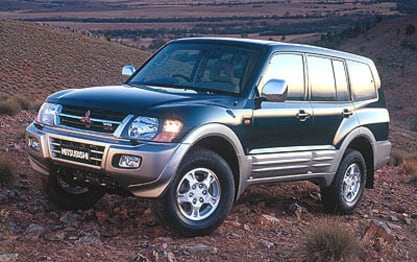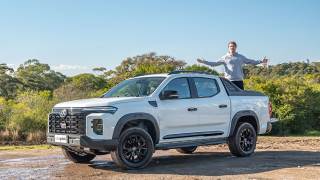
Used Mitsubishi Pajero review: 2001-2016
- Mitsubishi Pajero
- Mitsubishi Pajero 2005
- Mitsubishi Pajero 2006
- Mitsubishi Pajero 2007
- Mitsubishi Pajero 2001
- Mitsubishi Pajero 2002
- Mitsubishi Pajero 2003
- Mitsubishi Pajero 2009
- Mitsubishi Pajero 2010
- Mitsubishi Pajero 2013
- Mitsubishi Pajero 2011
- Mitsubishi Pajero 2004
- Mitsubishi Pajero 2008
- Mitsubishi Pajero 2014
- Mitsubishi Pajero 2016
- Mitsubishi Pajero 2012
- Mitsubishi Pajero 2015
- Mitsubishi Pajero Reviews
- Mitsubishi Reviews
- Mitsubishi SUV Range
- SUV
- Mitsubishi
- Used Car Reviews
- Off road
- Family Cars
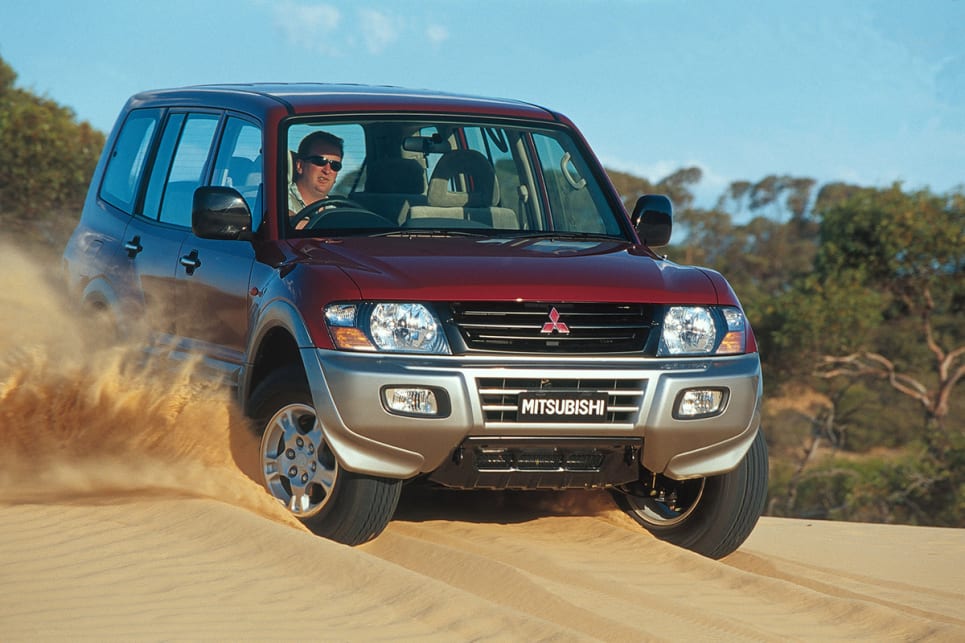
When introduced to Australia in 1983, the Mitsubishi Pajero was arguably the first affordable 4WD that was a family wagon rather than a truck-based 4WD.
However, this is a genuine SUV, not a passenger car with a tough looking body, Pajero is competent off-road, being able to handle most situations likely to be encountered by an adventurous family in the great Aussie countryside or on beaches.
Though it began its life in downunder as a body-on-chassis 4WD, it became a monocoque for improved ride and comfort in 2000. Good engineering meant the post-2000 models retained similar strength to the chassis models. All have a low-range case for tough, slow conditions.
While we are considering the monocoque models from the year 2000 in this feature you should be aware the older ones may be past their use-by date. Unless you can do a fair bit of your own mechanical work you're probably better off considering models from the new generation in December 2006.
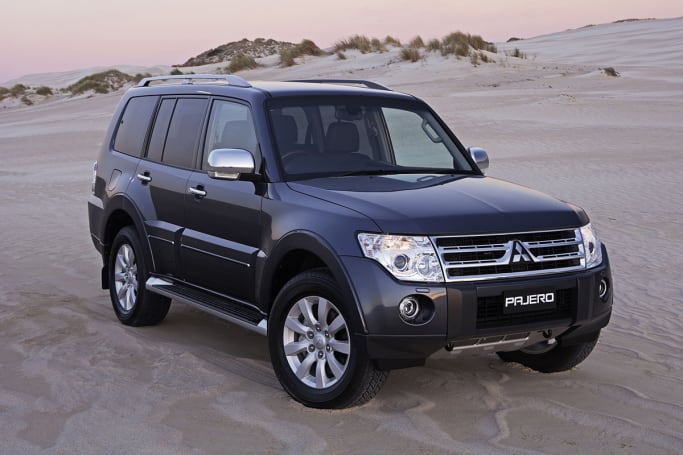
Mitsubishi’s sophisticated Super Select drivetrain permits the use of all-wheel-drive under any circumstance. For example, safe traction on wet sealed roads if you opt for AWD, or lower fuel consumption on dry dirt roads if you go for 2WD. AWD can be engaged or disengaged on the fly at any speed up to 100 km/h.
Midway through 2013 Pajero was brought right up to date in its infotainment and safety equipment. These models are popular with buyers who can't come up with the dollars to buy a brand new one.
Mitsubishi Pajero comes as a station wagon with either two or four passenger doors. The two-door was never particularly popular and imports stopped with the all-new model of 2000. They reappeared with the when the new model was launched at the start of end of 2006, then disappeared due to lack of buyer interest in 2010.
All short-wheelbase Pajeros have five seats, the long-wheelbase models have either five or seven. The rearmost two seats in the seven-seat models are better suited to kids than adults but with a bit of squeezing up the Pajero can handle seven grown-ups.
Though the first Pajeros had a petrol four-cylinder engine, all petrols under review here are V6s. This was a 3.5 twin-cam unit until September 2003 when it was uprated to a 3.8-litre.
Diesel power is preferred by most buyers, the large four-cylinder units, 2.8 then 3.2 litres, have good torque and seem to enjoy hard work.
Pajero is offered in manual and automatic transmissions, with the latter being almost universal in later years.
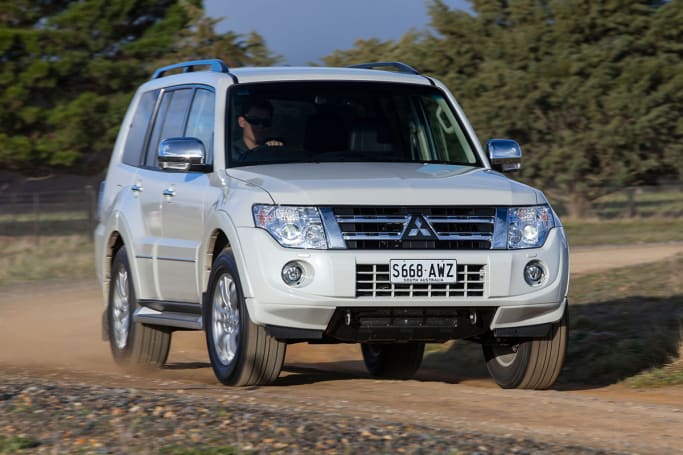
The Australian Mitsubishi dealer network is long established and well-organised. Spare parts are generally available for all but the oldest models. Prices can be relatively high as 4WD bits are more rugged and can come as a surprise if you've only owned sedans in the past.
Insurance premiums are about average for this class and there doesn’t seem to be much difference of opinion on the insurance risk amongst the major insurance companies.
Note that the Pajero Sport launched at the end of 2015 is actually a replacement for the outgoing Challenger, not an additional version of the standard Pajero range.
WHAT TO LOOK FOR
If you suspect a Pajero has been used off-road look for damage to door sills, door surfaces and bumper corners. Be very wary if the protection plates have been pushed up onto the mechanical items move them.
Check out the interior carefully because carting bored kids about can be tough on any vehicle. Damage to the cargo area is another sign of hard use.
Poor engine maintenance is hard on turbos and can lead to complete failure if the oil hasn't been changed on time. Check the service book.
Be sure all gears in a manual box engage easily and that the clutch is light and quiet in its action.
Automatic transmissions should go into Drive and Reverse promptly and easily.
Listen for, and feel for, noises and roughness in the complete driveline.
Make sure the brakes pull the Pajero up evenly, even on dirt.
Pricing
| Year | Price From | Price To |
|---|---|---|
| 2016 | $38,390 | $51,700 |
| 2015 | $26,510 | $48,070 |
| 2014 | $17,490 | $44,550 |
| 2013 | $15,400 | $37,510 |
| 2012 | $11,770 | $34,870 |
| 2011 | $8,800 | $30,360 |
| 2010 | $7,150 | $27,280 |
| 2009 | $5,500 | $25,740 |
| 2008 | $7,700 | $23,650 |
| 2007 | $7,260 | $20,790 |
| 2006 | $6,270 | $20,570 |
| 2005 | $6,710 | $17,160 |
| 2004 | $5,830 | $16,170 |
| 2003 | $2,970 | $16,170 |
| 2002 | $2,420 | $16,170 |
| 2001 | $2,640 | $10,450 |
Pricing guides
Range and Specs
| Vehicle | Specs | Price* | |
|---|---|---|---|
| GL LWB (4X4) | 2.8L, Diesel, 5 SP MAN 4X4 | $6,600 – 9,350 | 2001 Mitsubishi Pajero 2001 GL LWB (4X4) Pricing and Specs |
| iO (4x4) | 2.0L, ULP, 5 SP MAN | $2,640 – 4,070 | 2001 Mitsubishi Pajero 2001 iO (4x4) Pricing and Specs |
| GLS LWB (4X4) | 3.5L, ULP, 5 SP MAN 4X4 | $6,490 – 9,130 | 2001 Mitsubishi Pajero 2001 GLS LWB (4X4) Pricing and Specs |
| GLX LWB (4X4) | 2.8L, Diesel, 5 SP MAN 4X4 | $5,940 – 8,360 | 2001 Mitsubishi Pajero 2001 GLX LWB (4X4) Pricing and Specs |
$3,995
Lowest price, based on 15 car listings in the last 6 months




